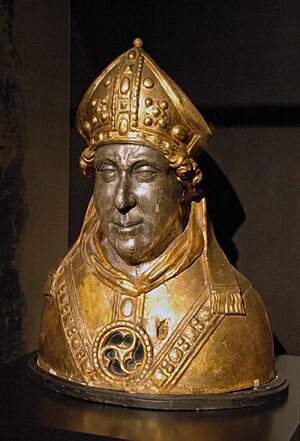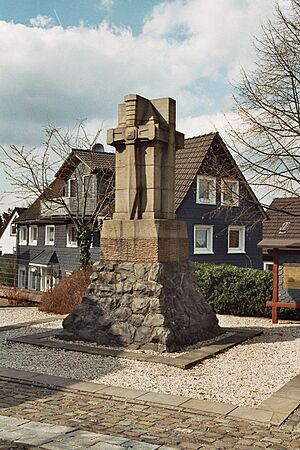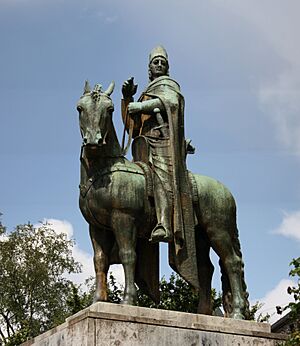Engelbert II of Berg facts for kids
Quick facts for kids Saint Engelbert of Cologne |
|
|---|---|
 |
|
| Archbishop of Cologne and Martyr | |
| Born | 1185 or 1186 Burg an der Wupper, Germany |
| Died | 7 November 1225 (aged 40 or 41) Gevelsberg, near Schwelm, Germany |
| Venerated in | Catholic Church |
| Major shrine | Cologne, Germany |
| Feast | 7 November |
| Attributes | a crosier in one hand, with an upraised sword, in the other, piercing a crescent moon |
Count Engelbert II of Berg, also known as Saint Engelbert, was an important leader in Germany during the Middle Ages. He was the archbishop of Cologne and also a saint. Engelbert was known for his strong leadership and for working to make things fair. Sadly, he was tragically killed by a member of his own family.
Contents
Early Life and Education
Engelbert was born in 1185 or 1186 at Schloss Burg in what is now Germany. He was the younger son of Count Engelbert I of Berg.
He went to school at the main cathedral in Cologne. When he was only 12 or 13, he became a provost (a church official) at St. George's church in Cologne. Later, he also became the provost at Cologne Cathedral. He held many other important church jobs in different cities. In 1203, he was asked to become the Bishop of Münster, but he said no because he was too young.
Early Challenges and Forgiveness
In 1206, Engelbert faced a big challenge. He was excommunicated by Pope Innocent III. This meant he was temporarily kicked out of the church. This happened because he supported his cousin, Adolf of Altena, in a political fight. Adolf was against Otto of Brunswick.
However, Engelbert was forgiven in 1208. To show he was truly sorry, he took part in the Albigensian Crusade in 1212. This was like a religious journey or military campaign. After a big battle in 1214, he became loyal to Frederick II, Holy Roman Emperor, who would become the future emperor.
Becoming Archbishop of Cologne
On February 29, 1216, Engelbert was chosen to be the Archbishop of Cologne. He was officially made archbishop on September 24, 1217. He held this important position until he died.
Engelbert earned the trust of Emperor Frederick II. In 1220, he became the imperial regent, which meant he helped rule the empire. He also became the guardian of the Emperor's young son, Henry. In 1222, Engelbert crowned 12-year-old Henry as the King of the Romans in Aachen. Engelbert continued to be Henry's teacher and protector until his own death.
Strengthening the Archdiocese
When Engelbert became archbishop, the lands and rights of the archdiocese (the area ruled by the archbishop) were in a bad state. There had been a lot of fighting and unrest. Engelbert immediately started working to get these lands back and protect them. He often fought against the Dukes of Limburg and their friends. He also made alliances with other powerful groups to protect his territory.
Engelbert also had to protect his own family's land, the County of Berg. His older brother died without a son, and another duke tried to claim the land. But according to the law, Engelbert was the rightful heir. He won this dispute and kept the land for his family.
During his time as archbishop, Engelbert gave special town privileges to many places. This meant these towns gained more freedom and rights. Some of these towns included Wipperfürth, Attendorn, Brilon, and Siegen.
Engelbert worked hard to make the Archdiocese of Cologne strong, both as a church authority and as a powerful state. He was known for being a very strong leader, almost like a king, even though he was a churchman. He also made sure the city of Cologne was well-managed. He was very dedicated to helping religious people and groups throughout his archdiocese.
Engelbert's Tragic Death

Memorial to the assassinated Archbishop in Gevelsberg
|
Engelbert was respected by the people he governed. He was fair and worked hard to keep law and order. He also cared deeply about the well-being of religious people. However, his strong actions and his loyalty to the Pope and Emperor sometimes caused problems with the powerful noble families, including his own relatives. This conflict eventually led to his death.
His cousin, Count Frederick of Isenberg, was in charge of Essen Abbey. He was accused of cheating the nuns there. Engelbert was determined to protect the nuns and bring Frederick to justice. On November 7, 1225, as they were traveling together, Engelbert was killed. This happened in a narrow valley near Gevelsberg. It is believed that Frederick was involved in his death.
It seems that a group of unhappy nobles might have been behind the attack. They might have planned to capture Engelbert, not necessarily kill him. Engelbert's body was taken to Cologne. When it was examined, it was found to have forty-seven wounds.
Becoming a Saint
Engelbert's body was buried in Cologne Cathedral on February 24, 1226. A high-ranking church official declared him a martyr, meaning he died for his faith. However, he was not formally made a saint right away. Later, in 1618, another archbishop of Cologne officially ordered that Engelbert's feast day be celebrated on November 7. His remains are still kept in a special shrine in Cologne today.
 | Victor J. Glover |
 | Yvonne Cagle |
 | Jeanette Epps |
 | Bernard A. Harris Jr. |


